Rapporti ISTISAN 09/49 ISTITUTO SUPERIORE DI SANITÀ Ageing ...
Rapporti ISTISAN 09/49 ISTITUTO SUPERIORE DI SANITÀ Ageing ...
Rapporti ISTISAN 09/49 ISTITUTO SUPERIORE DI SANITÀ Ageing ...
You also want an ePaper? Increase the reach of your titles
YUMPU automatically turns print PDFs into web optimized ePapers that Google loves.
<strong>Rapporti</strong> <strong>ISTISAN</strong> <strong>09</strong>/<strong>49</strong><br />
2.3. Physiological ageing theories<br />
The physiological ageing theories are divided in:<br />
- Stress theory<br />
It describes ageing as the result of the additive effect, over time, of the effects of the<br />
stresses of living. Each time a stress occurs it leaves a residual impairment from which<br />
one does not fully recover. Eventually the cumulative stresses deplete one’s body of<br />
needed reserves (Selye, 1966). The theory ignores the fact that, depending on how one<br />
learns to manage stress, the ability to handle stress and the side effects can actually be<br />
increased and improved.<br />
- Adaptation theory<br />
It attributes ageing to the failure of adaptive mechanisms (Blumenthal & Bems, 1964;<br />
Walford, 1969). For example, as one ages the antidiuretic hormone works less efficiently<br />
in preventing excess loss of body fluid through urination. There are many other ways in<br />
which the body’s physiologic changes with age may evidence failure of adaptive<br />
mechanisms such as (1) the fact that receptor sites important to sugar metabolism are<br />
fewer, (2) breathing capacity diminishes and (3) immune response is thought to decrease.<br />
- Immune system theory<br />
Theories about immunity and autoimmunity go as far back as the researchers Blumenthal<br />
& Berns and Walford. The theories are based on two observations: (1) that the<br />
functioning of the immune system decreases with age, as is autoimmune disease as one<br />
ages. The immune system includes the thymus, spleen, tonsils, bone marrow and<br />
lymphatic system. These produce many substances important to resisting infection<br />
including lymphocytes, antibodies, and interleukins (NIA, 1993).<br />
- Lymphocytes theory<br />
They are of two major types: B-cells and T-cells. B-cells (found in the bone marrow)<br />
secrete antibodies to overcome infections. T-cells are further divided into (1) cytotoxic Tcells<br />
and (2) helper T-cells. Cytotoxic T-cells attack infected or damaged cells directly;<br />
helper T-cells produce chemicals that assist other immune system substances to function. Tcells<br />
are formed in the thymus, which decreases in weight and ability to produce T-cells as<br />
one ages (NIA, 1993). It is known that the interleukins help regulate the immune system.<br />
Researchers have found that interleukin-6 rises with age. It is thought that this increase<br />
interferes with immune system response. Another observation has been that interleukin-2,<br />
which stimulates T-cell production thereby improving resistance to infection, declines as<br />
one ages (NIA, 1993). The decrease in immunological function may result in an increase in<br />
autoimmunological function. There is some evidence that there is an increase in<br />
autoantibodies in older people, which act to destroy normal cells (NIA, 1993).<br />
- Calorie restriction theory<br />
Research done on animals gives some support to the theory that fewer calories are better<br />
than more calories. Mice which were given 30 to 60% fewer calories than the comparison<br />
mice lived longer than the mice on higher calorie diets. Currently, the effect of dietary<br />
calories is being studied in other species and primates (NIA, 1993).<br />
- Behavioural factors theory<br />
12



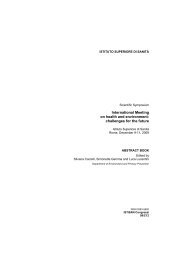
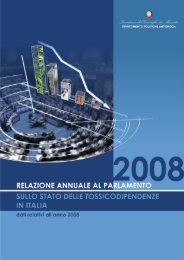
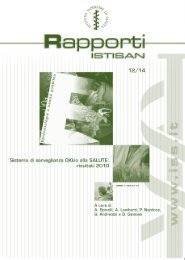
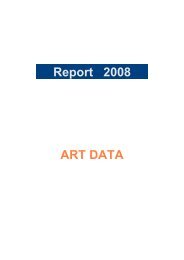
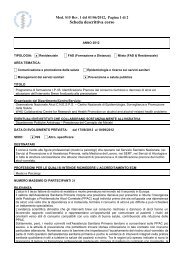
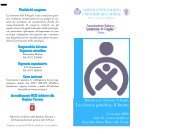
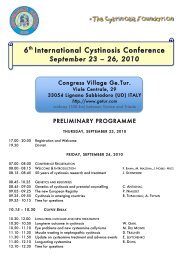
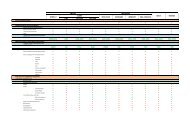
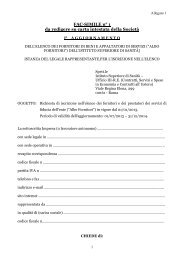
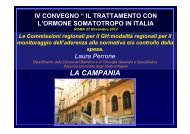
![Emilia Romagna [PDF - 175.10 kbytes]](https://img.yumpu.com/23556597/1/184x260/emilia-romagna-pdf-17510-kbytes.jpg?quality=85)
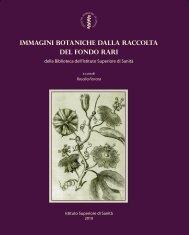
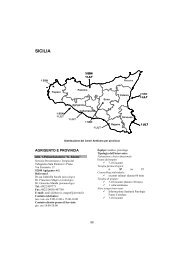
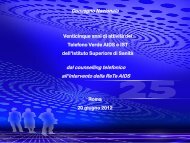
![Istisan Congressi N. 66 (Pag. 1 - 81). [PDF - 2021.12 kbytes] - Istituto ...](https://img.yumpu.com/23556493/1/171x260/istisan-congressi-n-66-pag-1-81-pdf-202112-kbytes-istituto-.jpg?quality=85)